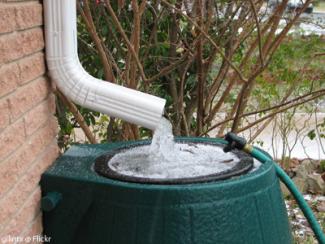Around the Yard
Your yard care routine can be stormwater friendly! Just follow the tips below to help reduce stormwater pollution.
Don’t Dump Into Storm Drains

- Don’t dump, wash, or rake anything directly into a storm drain or into the path of storm drain.
- Keep all lawn chemicals and yard debris out of storm drains. Even grass clippings and excess leaves don’t belong in our streams and rivers.
Fertilize Sparingly
Unfortunately, lawn care chemicals often wind up washing right into local waters.

- Go natural -and you may not need any fertilizer at all! Mow high and leave grass clippings on the lawn. It helps improve the lawn’s health and quality, and you’re less likely to need fertilizer.
- If you must fertilize, September is the best month. And be sure to use slow-release fertilizer.
- If you want to fertilize more than once, wait until after the spring green-up. A good rule of thumb: wait until you’ve mowed the lawn three times.
- More is not always better! Skip the “step programs” offered by many lawn care companies, and be sure to apply fertilizers and pesticides only as directed. Using less will save you money, too! If you do use a lawn care company, ask them about their environmental options and certifications.
- Avoid using fertilizers or pesticides near wellheads or within 75 feet of waterways.
- Check the weather forecast before applications, and don’t apply fertilizers or pesticides when there is rain predicted.
- Avoid using combination fertilizer/pesticide products. Hand pick weeds when possible, and if you must treat weeds or insects with pesticides, spot treat them rather than dousing the entire lawn.
Sweep Spills Back Onto The Lawn
Anything that’s lying on pavement is more easily washed by stormwater down storm drains.
- If any chemicals or yard debris get on the sidewalk or driveway, sweep them back onto the lawn to prevent it from washing into storm drains.
- Don’t hose the driveway or the sidewalk to get it clean.
Water Wisely
Conserving water when you’re working outdoors can reduce the potential for contaminants to wind up in local waters.

- Established lawns are happy with one inch of water per week, including rainfall. And if you must water, water just once a week for a deep soaking.
- Adjust sprinklers so that they don’t water paved surfaces. In the event that it’s unavoidable, direct the flow of water toward your lawn or garden.
- Check the weather forecast, if you have automatic sprinklers, and be sure they aren’t programmed to come on in the rain.
- Don’t water in the heat of the day. Water early in the morning or in the evening minimizes the water lost to evaporation.
- Consider using slow-watering techniques such as drip irrigation or soaker hoses.
Recycle Rainwater
The water that runs off roofs and other hard surfaces often flows directly to the nearest storm drain. Instead, consider one of the following methods to keep stormwater on your property and out of storm drains!

- Get a rain barrel or install a small, aboveground storage tank under a roof downspout or connected directly to the downspout. The water that’s captured can be used for irrigation.
- If the runoff from your roof flows directly onto pavement, consider using downspout extenders to direct the water to a landscaped area instead.
- A rain garden, an area that collects and treats runoff, is a stormwater-friendly addition to any yard.
- If you’re thinking of re-paving your driveway, consider an alternative: a wide range of porous materials have become available that allow water to pass through their surface (in the case of porous asphalt or concrete) or through void spaces (in the case of concrete or grid pavers). Many times, these porous materials are the same price or cheaper than installing conventional asphalt or concrete.
View a Presentation
Download A Printable Factsheet
- Is Your Lawn Care Stormwater-Friendly?
- Is Your Yard A Sponge?
- The Rhode Island Water Resources Board website has more water conservation and lawn maintenance recommendations.
